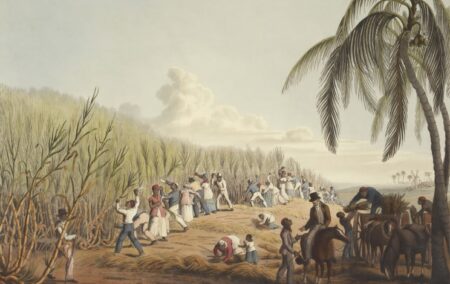A strange moment in the history of slavery happened in 1848. It was a clash between Europe and Africa. The Europeans wanted the Atlantic slave trade to end; the Africans wanted it to continue. In 1833, English Christians, such as William Wilberforce, managed to get slavery outlawed throughout the British Empire. Using brute force, the warships of the Royal Navy intercepted slave ships crossing from West Africa to the Americas and forced them to return their slaves to Africa. The African slave trading nations, who had for centuries prospered from the slave business, were outraged. They sent deputations to London and Paris to complain about abolition. How dare you rich white racist imperialists interfere in our African culture! How dare you end our traditional African business!
If “Black Lives Matter” had existed in 1848, would the BLM activists have sided with the white imperialists or the black nations?
Slavery is as old as the human race (about 200,000 years). Every continent has had slaves and slave masters. Every one of us has ancestors who were slaves or slave owners or both. Few if any of the philosophers of Ancient Greece and Rome had concerns about slavery. Christianity originated as a slave religion but, when it became powerful and institutionalised, its church leaders approved of slavery. Islam was similar. In Africa, different black African races enslaved other black African races. Joseph Conrad touches on this in “Heart of Darkness” and is more explicit in the 1897 work, “An Outpost of Progress”.
Arab slave traders had for centuries been transporting black African slaves across the Sahara to North Africa and the Middle East. The males were castrated and used as house slaves. African slave traders were delighted when white men from Europe expanded their business by buying slaves to ship across the Atlantic. The male slaves in the American plantations were kept whole, and married and had children. Francis Drake, English hero, faithful champion of Elizabeth I, contemporary of Shakespeare, was a slave trader. Bristol and Liverpool became rich through the slavery. Slavery in the Cape seems to have been even more brutal than that in the American plantations.
Britain was the first country in history to outlaw the slave trade. The reason was a blend of morality and economics, a mixture of Christian conscience and capitalist success. Capitalism made England the richest nation on Earth, and wealth is always accompanied by moral attitudes. Privileged European Christians, relieved of the struggle for survival that has been the lot of most humans for most of history, could afford to care about the oppressed. They said slavery was evil, and persuaded the rich rulers of England to abolish it.
The US Civil War (1861-5) between North and South was fought for complicated reasons but slavery was the most important. The northern economy was mainly industrial and capitalist, the southern agricultural and slave-based. Capitalism, based on freedom, is always more efficient than slavery, based on coercion. The South had better soldiers; the North a better economy. The North won. (In WW2, the National Socialist Germans had a better army than the capitalist Americans but the Americans had a better economy and so thrashed them.)
Communism is mainly a restoration of slavery. It is based on coercion and denial of choice. Under slavery, you are forced to work for one master; under communism you are forced to work for the state, which often means one master again, such as Stalin. The Soviet gulags were essentially slave camps.
In my view slavery is evil, and always has been. But that is not the view of most men, including philosophers, statesmen and religious leaders, throughout most history. I despise the statues of those who achieved their greatness through the slave trade, such as those dignified stone figures in Bristol and Liverpool. I also despise the black slave dealers of the past but, as far as I know, there are no statues of them in West Africa.
The most difficult argument to counter is that of changing historical morality. In our poorer, more dangerous, more ignorant past, people could not be expected to have the same high moral standards that exist today. You mustn’t blame our forebears if they mocked mentally handicapped people; if they gathered in big crowds to watch public executions (including those where the victim was disemboweled while still alive and his intestines, still attached, roasted on a fire, before he was beheaded, and cut into four pieces); and if they caught other human beings and enslaved them until death, using the whip and the noose to stop them escaping.
But our morality now is our morality now, and now we live by it and condemn those who do not. Slavery is evil. It is too late to punish those who benefited from it but we must not honour them. And we must judge all slave traders, Christian and Muslim, black and white, by the same standard.
The views of the writer are not necessarily the views of the Daily Friend or the IRR
If you like what you have just read, subscribe to the Daily Friend
Photo by British Library on Unsplash

